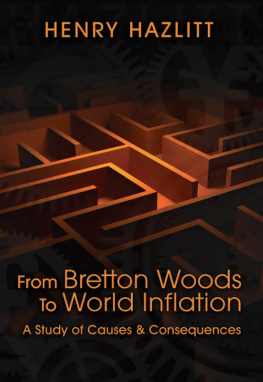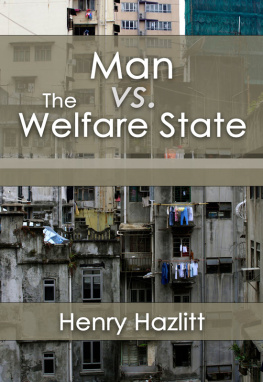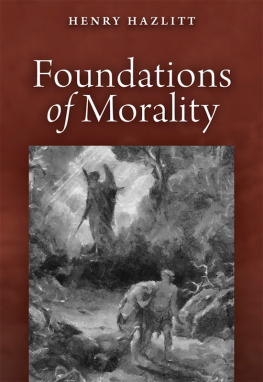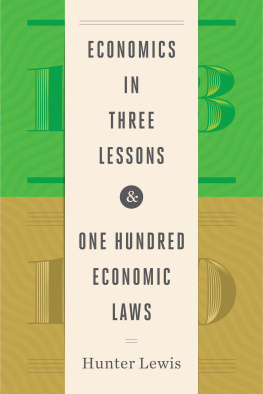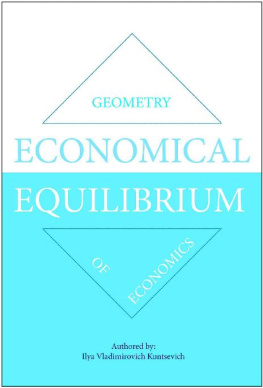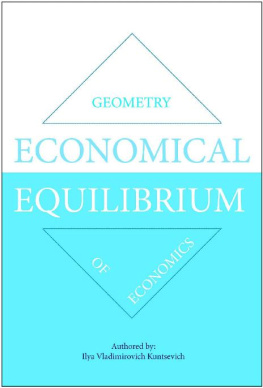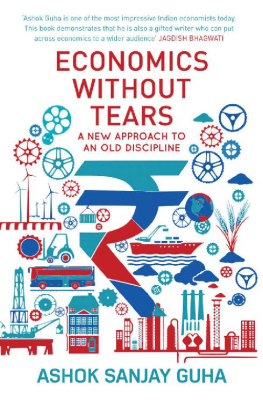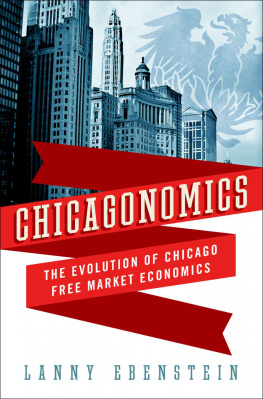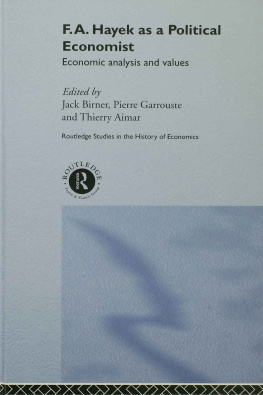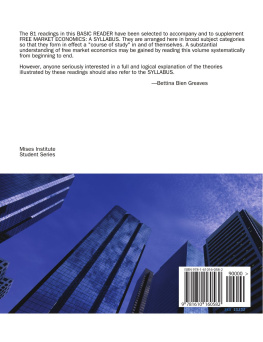Henry Hazlitt - Economics In One Lesson
Here you can read online Henry Hazlitt - Economics In One Lesson full text of the book (entire story) in english for free. Download pdf and epub, get meaning, cover and reviews about this ebook. year: 1952, publisher: Harper & Brothers, genre: Science. Description of the work, (preface) as well as reviews are available. Best literature library LitArk.com created for fans of good reading and offers a wide selection of genres:
Romance novel
Science fiction
Adventure
Detective
Science
History
Home and family
Prose
Art
Politics
Computer
Non-fiction
Religion
Business
Children
Humor
Choose a favorite category and find really read worthwhile books. Enjoy immersion in the world of imagination, feel the emotions of the characters or learn something new for yourself, make an fascinating discovery.

- Book:Economics In One Lesson
- Author:
- Publisher:Harper & Brothers
- Genre:
- Year:1952
- Rating:4 / 5
- Favourites:Add to favourites
- Your mark:
- 80
- 1
- 2
- 3
- 4
- 5
Economics In One Lesson: summary, description and annotation
We offer to read an annotation, description, summary or preface (depends on what the author of the book "Economics In One Lesson" wrote himself). If you haven't found the necessary information about the book — write in the comments, we will try to find it.
Economics In One Lesson — read online for free the complete book (whole text) full work
Below is the text of the book, divided by pages. System saving the place of the last page read, allows you to conveniently read the book "Economics In One Lesson" online for free, without having to search again every time where you left off. Put a bookmark, and you can go to the page where you finished reading at any time.
Font size:
Interval:
Bookmark:
HENRY HAZLITT
ECONOMICS IN ONE LESSON
SPECIAL EDITION FOR
THE FOUNDATION FOR ECONOMIC EDUCATION, INC.
IRVINGTON-ON-HUDSON, NEW YORK
POCKET BOOKS, INC., ROCKEFELLER CENTER, N. Y.
Economics is haunted by more fallacies than any other study known to man. This is no accident. The inherent difficulties of the subject would be great enough in any case, but they are multiplied a thousand fold by a factor that is insignificant in, say, physics, mathematics or medicinethe special pleading of selfish interests. While every group has certain economic interests identical with those of all groups, every group has also, as we shall see, interests antagonistic to those of all other groups. While certain public policies would in the long run benefit everybody, other policies would benefit one group only at the expense of all other groups. The group that would benefit by such policies, having such a direct interest in them, will argue for them plausibly and persistently. It will hire the best buyable minds to devote their whole time to presenting its case. And it will finally either convince the general public that its case is sound, or so befuddle it that clear thinking on the subject becomes next to impossible.
In addition to these endless pleadings of self-interest, there is a second main factor that spawns new economic fallacies every day. This is the persistent tendency of men to see only the immediate effects of a given policy, or its effects only on a special group, and to neglect to inquire what the long-run effects of that policy will be not only on that special group but on all groups. It is the fallacy of overlooking secondary consequences.
In this lies almost the whole difference between good economics and bad. The bad economist sees only what immediately strikes the eye; the good economist also looks beyond. The bad economist sees only the direct consequences of a proposed course; the good economist looks also at the longer and indirect consequences. The bad economist sees only what the effect of a given policy has been or will be on one particular group; the good economist inquires also what the effect of the policy will be on all groups.
The distinction may seem obvious. The precaution of looking for all the consequences of a given policy to everyone may seem elementary. Doesnt everybody know, in his personal life, that there are all sorts of indulgences delightful at the moment but disastrous in the end? Doesnt every little boy know that if he eats enough candy he will get sick? Doesnt the fellow who gets drunk know that he will wake up next morning with a ghastly stomach and a horrible head? Doesnt the dipsomaniac know that he is ruining his liver and shortening his life? Doesnt the Don Juan know that he is letting himself in for every sort of risk, from blackmail to disease? Finally, to bring it to the economic though still personal realm, do not the idler and the spendthrift know, even in the midst of their glorious fling, that they are heading for a future of debt and poverty?
Yet when we enter the field of public economics, these elementary truths are ignored. There are men regarded today as brilliant economists, who deprecate saving and recommend squandering on a national scale as the way of economic salvation; and when anyone points to what the consequences of these policies will be in the long run, they reply flippantly, as might the prodigal son of a warning father: In the long run we are all dead. And such shallow wisecracks pass as devastating epigrams and the ripest wisdom.
But the tragedy is that, on the contrary, we are already suffering the long-run consequences of the policies of the remote or recent past. Today is already the tomorrow which the bad economist yesterday urged us to ignore. The long-run consequences of some economic policies may become evident in a few months. Others may not become evident for several years. Still others may not become evident for decades. But in every case those long-run consequences are contained in the policy as surely as the hen was in the egg, the flower in the seed.
From this aspect, therefore, the whole of economics can be reduced to a single lesson, and that lesson can be reduced to a single sentence. The art of economics consists in looking not merely at the immediate but at the longer effects of any act or policy; it consists in tracing the consequences of that policy not merely for one group but for all groups.
Nine-tenths of the economic fallacies that are working such dreadful harm in the world today are the result of ignoring this lesson. Those fallacies all stem from one of two central fallacies, or both: that of looking only at the immediate consequences of an act or proposal, and that of looking at the consequences only for a particular group to the neglect of other groups.
It is true, of course, that the opposite error is possible. In considering a policy we ought not to concentrate only on its long-run results to the community as a whole. This is the error often made by the classical economists. It resulted in a certain callousness toward the fate of groups that were immediately hurt by policies or developments which proved to be beneficial on net balance and in the long run.
But comparatively few people today make this error; and those few consist mainly of professional economists. The most frequent fallacy by far today, the fallacy that emerges again and again in nearly every conversation that touches on economic affairs, the error of a thousand political speeches, the central sophism of the new economics, is to concentrate on the short-run effects of policies on special groups and to ignore or belittle the long-run effects on the community as a whole. The new economists flatter themselves that this is a great, almost a revolutionary advance over the methods of the classical or orthodox economists, because the former take into consideration short-run effects which the latter often ignored. But in themselves ignoring or slighting the long run effects, they are making the far more serious error. They overlook the woods in their precise and minute examination of particular trees. Their methods and conclusions are often profoundly reactionary. They are sometimes surprised to find themselves in accord with seventeenth-century mercantilism. They fall, in fact, into all the ancient errors (or would, if they were not so inconsistent) that the classical economists, we had hoped, had once for all got rid of.
It is often sadly remarked that the bad economists present their errors to the public better than the good economists present their truths. It is often complained that demagogues can be more plausible in putting forward economic nonsense from the platform than the honest men who try to show what is wrong with it. But the basic reason for this ought not to be mysterious. The reason is that the demagogues and bad economists are presenting half-truths. They are speaking only of the immediate effect of a proposed policy or its effect upon a single group. As far as they go they may often be right. In these cases the answer consists in showing that the proposed policy would also have longer and less desirable effects, or that it could benefit one group only at the expense of all other groups. The answer consists in supplementing and correcting the half-truth with the other half. But to consider all the chief effects of a proposed course on everybody often requires a long, complicated, and dull chain of reasoning. Most of the audience finds this chain of reasoning difficult to follow and soon becomes bored and inattentive. The bad economists rationalize this intellectual debility and laziness by assuring the audience that it need not even attempt to follow the reasoning or judge it on its merits because it is only classicism or laissez faire or capitalist apologetics or whatever other term of abuse may happen to strike them as effective.
Next pageFont size:
Interval:
Bookmark:
Similar books «Economics In One Lesson»
Look at similar books to Economics In One Lesson. We have selected literature similar in name and meaning in the hope of providing readers with more options to find new, interesting, not yet read works.
Discussion, reviews of the book Economics In One Lesson and just readers' own opinions. Leave your comments, write what you think about the work, its meaning or the main characters. Specify what exactly you liked and what you didn't like, and why you think so.

